(完整版)比较级和最高级
完整版)比较级最高级变化规则总结
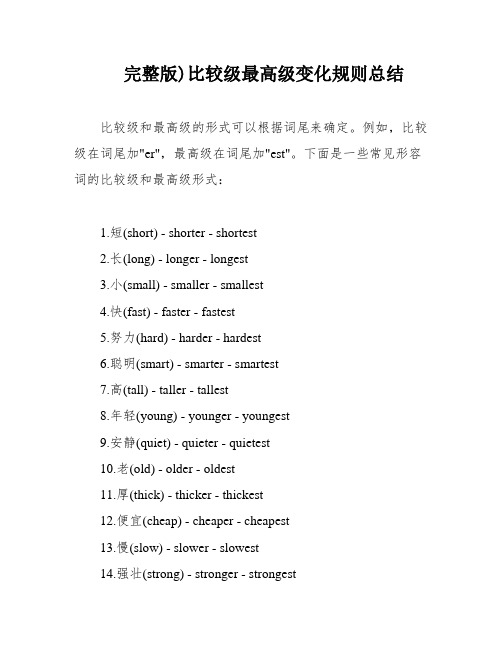
完整版)比较级最高级变化规则总结比较级和最高级的形式可以根据词尾来确定。
例如,比较级在词尾加"er",最高级在词尾加"est"。
下面是一些常见形容词的比较级和最高级形式:1.短(short) - shorter - shortest2.长(long) - longer - longest3.小(small) - smaller - smallest4.快(fast) - faster - fastest5.努力(hard) - harder - hardest6.聪明(smart) - smarter - smartest7.高(tall) - taller - tallest8.年轻(young) - younger - youngest9.安静(quiet) - quieter - quietest10.老(old) - older - oldest11.厚(thick) - thicker - thickest12.便宜(cheap) - cheaper - cheapest13.慢(slow) - slower - slowest14.强壮(strong) - stronger - strongest15.弱(weak) - weaker - weakest16.新(new) - newer - newest17.温暖(warm) - warmer - warmest18.冷(cold) - colder - coldest19.凉爽(cool) - cooler - coolest20.害羞(shy) - shyer - XXX21.紧(tight) - tighter - tightest22.干净(clean) - cleaner - cleanest23.聪明(clever) - cleverer - cleverest对于以不发音"e"结尾的单音节词,比较级直接加"r",最高级直接加"st"。
(完整版)比较级和最高级变化规则

四.形容词和的比较级和最高级的变化规则类似。
规则变化如下构成规则例词一般情况,在单音节或双音节词的词尾直接加-er, -esttall—taller—tallestgreat—greater—greatestnear—nearer—nearestsoon—sooner—soonesthard—harder—hardestfast—faster—fastest以不发音 e 结尾的单音节词,只加-r, -st large—larger—largest nice—nicer—nicestlate—later—latest以重读闭音节结尾,并且以一个元音字母加一个辅音字母结尾的单词,先双写最后这个辅音字母,再加-er,-estbig—bigger—biggesthot—hotter—hottestfat—fatter—fattest wet—wetter—wettestthin—thinner—thinnest以“辅音字母+y”结尾的单词,把 y 改为 i, 再加-er, -est happy—happier—happiestheavy—heavier—heaviesteasy—easier—easiestearly—earlier—earliest大部分双音节词和多音节词,在原级前面加 more, most 来构成比较级和最高级friendly—more friendly—most friendlyrelaxed—more relaxed—most relaxed important—more important—mostcarefully—more carefully—most carefully构成规则例词以形容词加-ly 构成的副词,在原形前加more, most 构成比较级和最高级 quickly—more quickly—most quickly easily—more easily—most easilyclearly—more clearly—most clearly形容词和副词的不规则变化。
比较级与最高级

1.比较级:将二者进行比较产生的词形。
单音节形容词和部分双音节词,一般在词尾加-er,如high-higher;注:一个元音aeiou(发音不是字母)构成一个音节。
以字母e结尾的词,在词尾加-r,如large-larger;重读闭音节词词尾只有一个辅音字母时,先双写该辅音字母,再加er,如big-bigger;注:以一个或几个辅音字母(r 除外)结尾而中间只有一个元音字母的音节,称为重读闭音节。
以"辅音字母+y“结尾的双音节词,先把”y“改为”i“,再加-er,如happy-happier;多音节词和部分双音节词,在词前加”more“,如dangerous-more dangerous;部分形容词和副词的比较级是不规则的,如good/well-better,bad/badly-worse;由“动词+后缀-ing/-ed”构成的形容词,在词前加more构成比较级,如interesting-more interesting;由“形容词+后缀-ly”构成的副词,在该副词前加more构成比较级,如slowly-more slowly,happily- more happily。
2.最高级:三者或三者以上的人或物进行比较时。
用法全部与比较级类似。
3.复数:语言中与单数相对,两个及两个以上的可数名词。
直接加-s, 如:bag-bags;当单数名词结尾为s,z,x,sh, ch时加-es, 如:box-boxes;以o结尾的名词,通常有生命的加es无生命的加s,如:photo-photos(无生命),tomato-tomatoes(有生命);不规则变化,如:child-children;不变化,如:sheep-sheep;可数名词以y结尾,把y去掉再加ies,如:factory-factories。
4.过去式规则动词一般动词直接加-ed,e.g.look-looked;以e结尾的动词直接加-d,e.g.dance-danced;辅音字母加y结尾的,变y为i再加ed,e.g.study-studied;以重读闭音节结尾,末尾只有一个辅音字母(字母w,y,x除外),双写这个辅音字母加-ed,e.g.skip-skipped;以l结尾的动词,若以非重读音节结尾,则末尾的字母l双写与不双写均可。
(完整版)动词的比较级和最高级变化规则
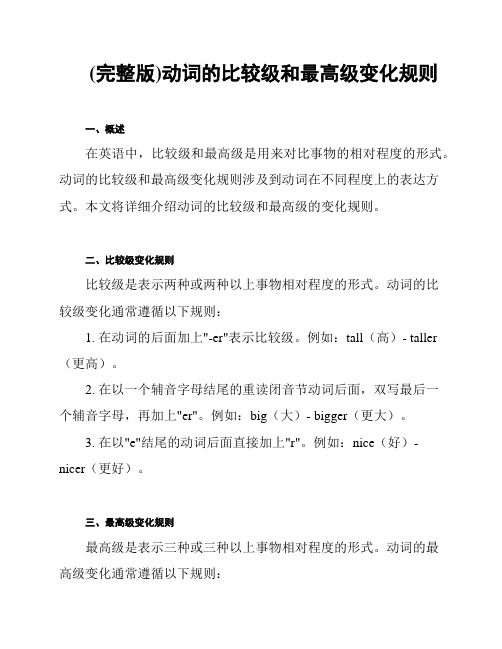
(完整版)动词的比较级和最高级变化规则一、概述在英语中,比较级和最高级是用来对比事物的相对程度的形式。
动词的比较级和最高级变化规则涉及到动词在不同程度上的表达方式。
本文将详细介绍动词的比较级和最高级的变化规则。
二、比较级变化规则比较级是表示两种或两种以上事物相对程度的形式。
动词的比较级变化通常遵循以下规则:1. 在动词的后面加上"-er"表示比较级。
例如:tall(高)- taller (更高)。
2. 在以一个辅音字母结尾的重读闭音节动词后面,双写最后一个辅音字母,再加上"er"。
例如:big(大)- bigger(更大)。
3. 在以"e"结尾的动词后面直接加上"r"。
例如:nice(好)- nicer(更好)。
三、最高级变化规则最高级是表示三种或三种以上事物相对程度的形式。
动词的最高级变化通常遵循以下规则:1. 在动词的后面加上"-est"表示最高级。
例如:tall(高)- tallest(最高)。
2. 在以一个辅音字母结尾的重读闭音节动词后面,双写最后一个辅音字母,再加上"est"。
例如:big(大)- biggest(最大)。
3. 在以"e"结尾的动词后面直接加上"st"。
例如:nice(好)- nicest(最好)。
四、不规则变化除了上述规则,还有一些动词变化的方式比较特殊,需要根据具体情况进行记忆:1. 不规则动词的比较级和最高级通常是通过改变单词本身的形式来实现的。
例如:good(好)- better(更好)- best(最好)。
2. 一些动词在比较级和最高级形式上的变化比较特殊,需要进行特别记忆。
例如:well(好)- better(更好)- best(最好)。
五、总结动词的比较级和最高级变化规则可以帮助我们更准确地描述事物的相对程度。
比较级(完整版)

比较级(完整版)XXXXXXXXXXXXthe worst形容词比较级和最高级形容词比较级和最高级用于描述物品、人或事物的大小、高度、强度、重量、年龄、智力等方面的差异。
下面是一些常用的形容词比较级和最高级。
原级快的 - fast高的 - XXX强 - strong高的 - high大的 - big胖的 - fat长的 - long重 - heavy干燥 - dry热的 - hot温暖 - warm年轻 - young懒惰 - lazy早的 - early美 - pretty好的 - nice许多 - many/much 比较级更快的 - faster更高的 - XXX更强的 - stronger 更高的 - higher更大的 - bigger更胖的 - fatter更长的 - longer更重的 - XXX更干燥的 - XXX 更热的 - hotter更温暖的 - warmer 更年轻的 - younger 更懒惰的 - lazier 更早的 - XXX更美的 - XXX更好的 - nicer更多的 - more更近的 - nearer更少的 - less更好的 - better最高级最快的 - the fastest最高的 - XXX最强的 - the strongest 最高的 - XXX最大的 - the biggest最胖的 - the fattest最长的 - the longest最重的 - XXX最干燥的 - XXX最热的 - the hottest最温暖的 - the warmest 最年轻的 - the youngest 最懒惰的 - the laziest 最早的 - XXX最美的 - the prettiest最好的 - the nicest最多的 - the most最近的 - the nearest最少的 - least最好的 - the best除此之外,还有一些其他的形容词比较级和最高级,比如慢的 - slow,短的 - short,虚弱的 - weak,低的 - low,小的 - small,瘦的 - thin,宽的 - wide,轻的 - light,潮湿的 - wet,寒冷的 - cold,凉的 - cool,老的 - old,聪明的 - smart,晚的 - late,聪明的 - clever,可爱的 - cute,深入的 - further/farther,远的 - far,少的 - few,坏的 - worse。
形容词的比较级和最高级大全
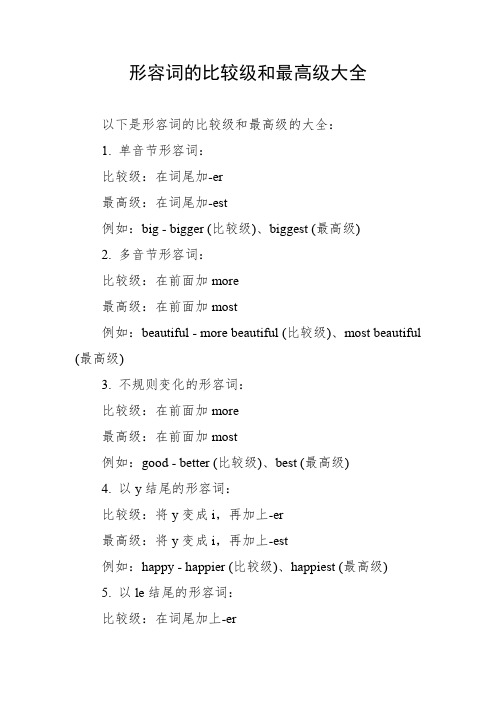
形容词的比较级和最高级大全以下是形容词的比较级和最高级的大全:1. 单音节形容词:比较级:在词尾加-er最高级:在词尾加-est例如:big - bigger (比较级)、biggest (最高级)2. 多音节形容词:比较级:在前面加more最高级:在前面加most例如:beautiful - more beautiful (比较级)、most beautiful (最高级)3. 不规则变化的形容词:比较级:在前面加more最高级:在前面加most例如:good - better (比较级)、best (最高级)4. 以y结尾的形容词:比较级:将y变成i,再加上-er最高级:将y变成i,再加上-est例如:happy - happier (比较级)、happiest (最高级)5. 以le结尾的形容词:比较级:在词尾加上-er最高级:在词尾加上-est例如:possible - more possible (比较级)、most possible (最高级)6. 少数不规则变化的形容词:比较级:在前面加more最高级:在前面加most例如:famous - more famous (比较级)、most famous (最高级)7. 特殊的比较级和最高级:例如:well - better (比较级)、best (最高级)8. 副词的比较级和最高级:比较级:在后面加-er最高级:在后面加-est例如:slowly - more slowly (比较级)、most slowly (最高级)以上是常见的形容词的比较级和最高级,但是也有一些不规则变化的形容词需要记忆。
同时,需要注意的是,有些形容词没有比较级和最高级,如unique。
(完整版)比较级和最高级
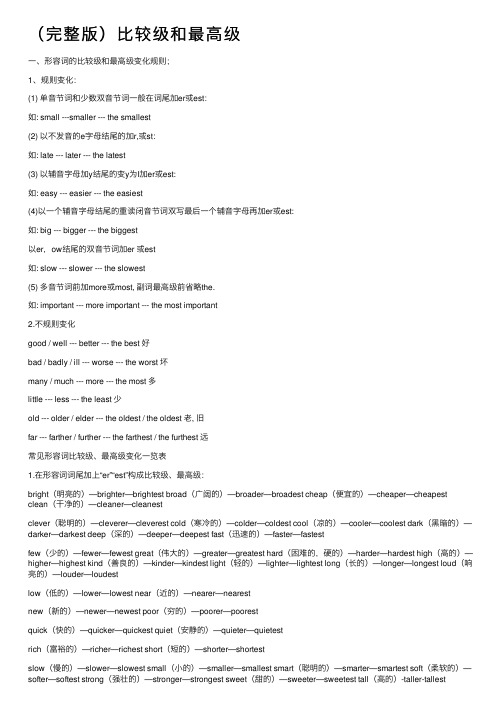
(完整版)⽐较级和最⾼级⼀、形容词的⽐较级和最⾼级变化规则;1、规则变化:(1) 单⾳节词和少数双⾳节词⼀般在词尾加er或est:如: small ---smaller --- the smallest(2) 以不发⾳的e字母结尾的加r,或st:如: late --- later --- the latest(3) 以辅⾳字母加y结尾的变y为I加er或est:如: easy --- easier --- the easiest(4)以⼀个辅⾳字母结尾的重读闭⾳节词双写最后⼀个辅⾳字母再加er或est:如: big --- bigger --- the biggest以er,ow结尾的双⾳节词加er 或est如: slow --- slower --- the slowest(5) 多⾳节词前加more或most, 副词最⾼级前省略the.如: important --- more important --- the most important2.不规则变化good / well --- better --- the best 好bad / badly / ill --- worse --- the worst 坏many / much --- more --- the most 多little --- less --- the least 少old --- older / elder --- the oldest / the oldest ⽼, 旧far --- farther / further --- the farthest / the furthest 远常见形容词⽐较级、最⾼级变化⼀览表1.在形容词词尾加上“er”“est”构成⽐较级、最⾼级:bright(明亮的)—brighter—brightest broad(⼴阔的)—broader—broadest cheap(便宜的)—cheaper—cheapest clean(⼲净的)—cleaner—cleanestclever(聪明的)—cleverer—cleverest cold(寒冷的)—colder—coldest cool(凉的)—cooler—coolest dark(⿊暗的)—darker—darkest deep(深的)—deeper—deepest fast(迅速的)—faster—fastestfew(少的)—fewer—fewest great(伟⼤的)—greater—greatest hard(困难的,硬的)—harder—hardest high(⾼的)—higher—highest kind(善良的)—kinder—kindest light(轻的)—lighter—lightest long(长的)—longer—longest loud(响亮的)—louder—loudestlow(低的)—lower—lowest near(近的)—nearer—nearestnew(新的)—newer—newest poor(穷的)—poorer—poorestquick(快的)—quicker—quickest quiet(安静的)—quieter—quietestrich(富裕的)—richer—richest short(短的)—shorter—shortestthick(厚的)—thicker—thickest warm(温暖的)—warmer—warmest weak(弱的)—weaker—weakest young(年轻的)—younger—youngest2.双写最后⼀个字母,再加上“er”“est”构成⽐较级、最⾼级:big(⼤的)—bigger—biggest fat(胖的)—fatter—fattesthot(热的)—hotter—hottest red(红的)—redder—reddestsad(伤⼼的)—sadder—saddest thin(瘦的)—thinner—thinnestwet(湿的)—wetter—wettest mad(疯的)—madder—maddest3.以不发⾳的字母e结尾的形容词,加上“r”“st”构成⽐较级、最⾼级:able(能⼲的)—abler—ablest brave(勇敢的)—braver—bravest close(接近的)—closer—closest fine(好的,完美的)—finer—finest large(巨⼤的)—larger—largest late(迟的)—later—latestnice(好的)—nicer—nicest ripe(成熟的)—riper—ripestrude(粗鲁的)—ruder—rudest safe(安全的)—safer—safest strange(奇怪的)—stranger—strangest wide(宽⼴的)—wider—widest wise(睿智的,聪明的)—wiser—wisest white(⽩的)—whiter—whitest4.以字母y结尾的形容词,把y改为i,再加上“er”“est”构成⽐较级、最⾼级:busy(忙碌的)—busier—busiest dirty(脏的)—dirtier—dirtiest dry(⼲燥的)—drier—driest early(早的)—earlier—earliest easy(容易的)—easier—easiest friendly(友好的)—friendlier—friendliest funny(好玩的)—funnier—funniest happy(开⼼的)—happier—happiest healthy(健康的)—healthier—healthiest heavy(重的)—heavier—heaviesthungry(饿的)—hungrier—hungriest lazy(懒惰的)—lazier—laziestlucky(幸运的)—luckier—luckiest naughty(调⽪的)—naughtier—naughtiest noisy(嘈杂的)—noisier—noisiestpretty(美丽的)—prettier—prettiest silly(傻的)—sillier—silliest spicy(辣的)—spicier—spiciestthirsty(渴的)—thirstier—thirstiest ugly(丑的)—uglier—ugliest4.双⾳节、多⾳节形容词,在单词前⾯加上“more”“most”构成⽐较级、最⾼级:afraid(害怕的)—more afraid—most afraidbeautiful(美丽的)—more beautiful—most beautifulcareful(仔细的)—more careful—most carefulcheerful(开⼼的)—more cheerful—most cheerfulcrowded(拥挤的)—more crowded—most crowdeddangerous(危险的)—more dangerous—most dangerousdelicious(美味的)—more delicious—most deliciousdifficult(困难的)—more difficult—most difficultexciting(令⼈兴奋的)—more exciting—most excitingexpensive(昂贵的)—more expensive—most expensivefamous(著名的)—more famous—most famousfrightened(受惊的)—more frightened—most frightenedfrightening(令⼈害怕的)—more frightening—most frighteninghard-working(勤奋的)—more hard-working—most hard-workinghonest(诚实的)—more honest—most honestimportant(重要的)—more important—most importantinteresting(有趣的)—more interesting—most interestingpolite(有礼貌的)—more polite—most politeterrible(可怕的)—more terrible—most terribletired(累的)—more tired—most tired5.不规则变化的形容词:bad(坏的)—worse—worst good(好的)—better—bestfar(远的)—farther—farthest (far—further—furthest)ill(病的)—worse—worst little(少的)—less—leastmany(多的)—more—most much(多的)—more—mostold(年⽼的)—older—oldest ( old—elder—eldest)well(好的,⾝体好的)—better—best⼀. 写出下列形容词或副词的⽐较级和最⾼级.bad ________________ ______________________________clean ________________ ______________________________ famous ______________ _______________________ dirty _________________ ______________________________big __________________ _____________________________small _________________ ______________________________heavy _____________ ______________________little __________________ ______________________________hard __________________ ______________________________ happy _______________________________________________far ___________________ ______________________________ expensive _____________________________________________________ well _________________ ______________________________easy __________________ ______________________________ wide __________________________________________________ young _________________ ________________________________ rude___________________ ________________________________ cheap __________________________________________________ ugly __________________ _________________________________ busy___________________ ________________________________ old _____________________________________________________ noisy __________________ _________________________________ interesting _____________________ _______________________________ hot _____________________________________________________ cold ___________________ _________________________________ many __________________ ________________________________ bright _________________________________________________ boring __________________ _______________________________ difficult_______________________ ________________________________ beautiful ____________________________________________________thin _____________________ _______________________________good ____________________ _______________________________strong____________________ ______________________________warm ________________ _______________________ late __________________ _______________________ weak _________________ ______________________ tall ___________________ ______________________ short __________________ ______________________ loud ___________________ ______________________ lazy ___________________ ______________________ quick __________________ ______________________ angry __________________ ______________________ clever __________________ ______________________ smart __________________ ______________________ low ____________________ __________________⼆、选择填空1. Which does Jimmy like _____ , Chinese or Art?A. wellB. bestC. betterD. much2. The Changjiang River is one of _____ in the world.A. the longest riverB. longest riversC. the longest riversD. longer rivers3. _____ of the two women is Mrs Brown.A. The beautifulB. The more beautifulC. More beautifulD. The most beautiful4. My mooncake is nicer _____ his.A. likeB. withC. forD. than5. You are fatter than _____ .B. hisC. himD. he is tall6. He jumps _____ of the three.A. farB. furtherC. farthestD. furthest7. My hair is longer than _____ .A. my sisterB. KateC. my brother’sD. Lucys’8. There are _____ paper here .Please bring some.A. littleB. lessC. fewerD. a little9. The pen is _____ than that one.A. more cheapB. cheapC. much cheaperD. quite cheaper10.Tom speaks Chinese _____ better than Jimmy.A. moreB. veryC. a lot ofD. much11.There are _____ girls in Class Two than in Class Four.A. moreB. nicestC. mostD. best12.It’s too _____ for you to do that.B. more dangerousC. harderD. the easiest13.Who has _____ apples now, Jim, Lily or Lucy?A. muchB. biggestC. betterD. the most14.You have more rulers than me. But _____ are nicer than _____ .A. mine, yoursB. mine, yourC. my, yoursD. my, your15.Tingting is _____ than Meimei, but Meimei is _____ than Tingting.A. all, strongerB. taller, strongestC. tallest, strongD. taller, stronger16.Mother is _____ in my family.A. busyB. busierC. the busiestD. more busy17.There are _____ in the park on Sunday.A. more childrenB. a lot of peopleC. much men and womenD. many peoples18.-This blue sweater is too big for me .-Will you please show me a _____ one?A. smallB. smallerC. the smallestD. smallest19.No one is _____ Mary in the class.B. as taller asC. so high asD. so tall as20. This bike is _____ than that one.A. twenty yuan dearB. twenty yuan dearerC. dear twenty yuanD. dearer twenty yuan[参考答案] CCDDA CDBCD AADAD CBBDB三、⽤所给词的适当形式填空1.Your classroom is _____ (wide) and _____ (bright) than ours.2.There are _____ (few) hours of sunlight a day in winter than in summer.3.Which do you like _____ (well) , maths or chemistry?4.This is the _____ (good) film I have ever seen.5.Africa is the second _____ (large) continent.6.What he said made his mother much _____ (angry) .7.I’m not as _____ (careful) as he.8.We’ve got as _____ (many) books as we need.9.Pratice as _____ (much) as you can.10.They have done _____ (much) work with _____ (little) money.11.You’re the _____ (kind) person I’ve ever met.12.He is _____ (young) than his two sisters.13.The _____ (old) I get, the _____ (strong) I seem to feel.14.The weather is getting _____ (warm) and _____ (warm) .15.Summer is _____ (hot) season of the year.[参考答案] 1. wider, brighter 2. fewer 3. better 4. best 5. largest 6. angry 7. careful 8. many 9. much 10. more, less 11. kindest 12. younger 13. older, stronger, 14. warmer, warmer 15. the hottest。
(完整版)比较级归类总结,推荐文档
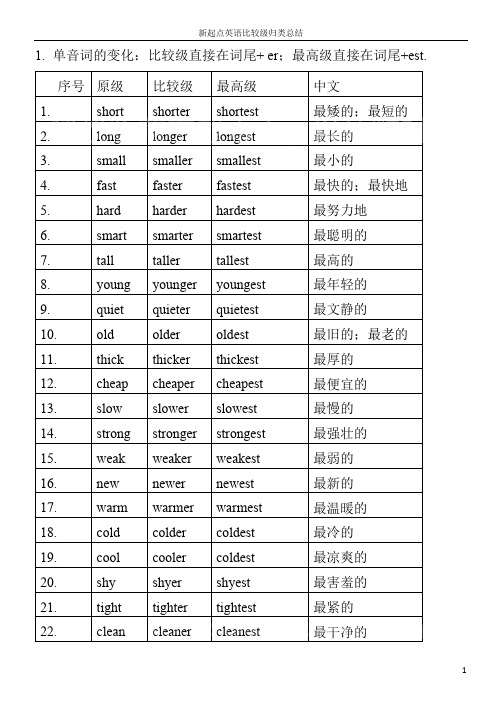
1.单音词的变化:比较级直接在词尾+ er;最高级直接在词尾+est.序号原级比较级最高级中文1.short shorter shortest最矮的;最短的2.long longer longest最长的3.small smaller smallest最小的4.fast faster fastest最快的;最快地5.hard harder hardest最努力地6.smart smarter smartest最聪明的7.tall taller tallest最高的8.young younger youngest最年轻的9.quiet quieter quietest最文静的10.old older oldest最旧的;最老的11.thick thicker thickest最厚的12.cheap cheaper cheapest最便宜的13.slow slower slowest最慢的14.strong stronger strongest最强壮的15.weak weaker weakest最弱的16.new newer newest最新的17.warm warmer warmest最温暖的18.cold colder coldest最冷的19.cool cooler coldest最凉爽的20.shy shyer shyest最害羞的21.tight tighter tightest最紧的22.clean cleaner cleanest最干净的23.clever cleverer cleverest最聪明的2.以不发音e结尾的单音节词,比较级直接加r;最高级直接加st.序号原级比较级最高级中文1.nice nicer nicest最友好的rge larger largest最大的3.fine finer finest最好的4.wide wider widest最宽的5.safe safer safest最安全的3.在重读闭音节(即:辅音+元音+辅音)中,要双写结尾的辅音字母,然后比较级加---er;最高级加---est。
- 1、下载文档前请自行甄别文档内容的完整性,平台不提供额外的编辑、内容补充、找答案等附加服务。
- 2、"仅部分预览"的文档,不可在线预览部分如存在完整性等问题,可反馈申请退款(可完整预览的文档不适用该条件!)。
- 3、如文档侵犯您的权益,请联系客服反馈,我们会尽快为您处理(人工客服工作时间:9:00-18:30)。
一、形容词的比较级和最高级变化规则;1、规则变化:(1) 单音节词和少数双音节词一般在词尾加er或est:如: small ---smaller --- the smallest(2) 以不发音的e字母结尾的加r,或st:如: late --- later --- the latest(3) 以辅音字母加y结尾的变y为I加er或est:如: easy --- easier --- the easiest(4)以一个辅音字母结尾的重读闭音节词双写最后一个辅音字母再加er或est:如: big --- bigger --- the biggest以er,ow结尾的双音节词加er 或est如: slow --- slower --- the slowest(5) 多音节词前加more或most, 副词最高级前省略the.如: important --- more important --- the most important2.不规则变化good / well --- better --- the best 好bad / badly / ill --- worse --- the worst 坏many / much --- more --- the most 多little --- less --- the least 少old --- older / elder --- the oldest / the oldest 老, 旧far --- farther / further --- the farthest / the furthest 远常见形容词比较级、最高级变化一览表1.在形容词词尾加上“er”“est”构成比较级、最高级:bright(明亮的)—brighter—brightest broad(广阔的)—broader—broadest cheap(便宜的)—cheaper—cheapest clean(干净的)—cleaner—cleanestclever(聪明的)—cleverer—cleverest cold(寒冷的)—colder—coldest cool(凉的)—cooler—coolest dark(黑暗的)—darker—darkest deep(深的)—deeper—deepest fast(迅速的)—faster—fastestfew(少的)—fewer—fewest great(伟大的)—greater—greatest hard(困难的,硬的)—harder—hardest high(高的)—higher—highest kind(善良的)—kinder—kindest light(轻的)—lighter—lightest long(长的)—longer—longest loud(响亮的)—louder—loudestlow(低的)—lower—lowest near(近的)—nearer—nearestnew(新的)—newer—newest poor(穷的)—poorer—poorestquick(快的)—quicker—quickest quiet(安静的)—quieter—quietestrich(富裕的)—richer—richest short(短的)—shorter—shortestslow(慢的)—slower—slowest small(小的)—smaller—smallest smart(聪明的)—smarter—smartest soft(柔软的)—softer—softest strong(强壮的)—stronger—strongest sweet(甜的)—sweeter—sweetest tall(高的)-taller-tallest thick(厚的)—thicker—thickest warm(温暖的)—warmer—warmest weak(弱的)—weaker—weakest young(年轻的)—younger—youngest2.双写最后一个字母,再加上“er”“est”构成比较级、最高级:big(大的)—bigger—biggest fat(胖的)—fatter—fattesthot(热的)—hotter—hottest red(红的)—redder—reddestsad(伤心的)—sadder—saddest thin(瘦的)—thinner—thinnestwet(湿的)—wetter—wettest mad(疯的)—madder—maddest3.以不发音的字母e结尾的形容词,加上“r”“st”构成比较级、最高级:able(能干的)—abler—ablest brave(勇敢的)—braver—bravest close(接近的)—closer—closest fine(好的,完美的)—finer—finest large(巨大的)—larger—largest late(迟的)—later—latestnice(好的)—nicer—nicest ripe(成熟的)—riper—ripestrude(粗鲁的)—ruder—rudest safe(安全的)—safer—safest strange(奇怪的)—stranger—strangest wide(宽广的)—wider—widest wise(睿智的,聪明的)—wiser—wisest white(白的)—whiter—whitest4.以字母y结尾的形容词,把y改为i,再加上“er”“est”构成比较级、最高级:busy(忙碌的)—busier—busiest dirty(脏的)—dirtier—dirtiest dry(干燥的)—drier—driest early(早的)—earlier—earliest easy(容易的)—easier—easiest friendly(友好的)—friendlier—friendliest funny(好玩的)—funnier—funniest happy(开心的)—happier—happiest healthy(健康的)—healthier—healthiest heavy(重的)—heavier—heaviesthungry(饿的)—hungrier—hungriest lazy(懒惰的)—lazier—laziestlucky(幸运的)—luckier—luckiest naughty(调皮的)—naughtier—naughtiest noisy(嘈杂的)—noisier—noisiest pretty(美丽的)—prettier—prettiest silly(傻的)—sillier—silliest spicy(辣的)—spicier—spiciestthirsty(渴的)—thirstier—thirstiest ugly(丑的)—uglier—ugliest4.双音节、多音节形容词,在单词前面加上“more”“most”构成比较级、最高级:afraid(害怕的)—more afraid—most afraidbeautiful(美丽的)—more beautiful—most beautifulcareful(仔细的)—more careful—most carefulcheerful(开心的)—more cheerful—most cheerfulcrowded(拥挤的)—more crowded—most crowdeddangerous(危险的)—more dangerous—most dangerousdelicious(美味的)—more delicious—most deliciousdifficult(困难的)—more difficult—most difficultexciting(令人兴奋的)—more exciting—most excitingexpensive(昂贵的)—more expensive—most expensivefamous(著名的)—more famous—most famousfrightened(受惊的)—more frightened—most frightenedfrightening(令人害怕的)—more frightening—most frighteninghard-working(勤奋的)—more hard-working—most hard-workinghelpful(有帮助的)—more helpful—most helpfulhonest(诚实的)—more honest—most honestimportant(重要的)—more important—most importantinteresting(有趣的)—more interesting—most interestingpolite(有礼貌的)—more polite—most politeterrible(可怕的)—more terrible—most terribletired(累的)—more tired—most tired5.不规则变化的形容词:bad(坏的)—worse—worst good(好的)—better—bestfar(远的)—farther—farthest (far—further—furthest)ill(病的)—worse—worst little(少的)—less—leastmany(多的)—more—most much(多的)—more—mostold(年老的)—older—oldest ( old—elder—eldest)well(好的,身体好的)—better—best一. 写出下列形容词或副词的比较级和最高级.bad ________________ ______________________________clean ________________ ______________________________ famous ______________ _______________________dirty _________________ ______________________________big __________________ _____________________________small _________________ ______________________________heavy _____________ ______________________little __________________ ______________________________hard __________________ ______________________________ happy _________________ ______________________________far ___________________ ______________________________ expensive _____________________ ________________________________ well _________________ ______________________________easy __________________ ______________________________ wide ___________________ _______________________________ young _________________ ________________________________ rude ___________________ ________________________________ cheap ___________________ _______________________________ ugly __________________ _________________________________ busy ___________________ ________________________________ old ____________________ _________________________________ noisy __________________ _________________________________ interesting _____________________ _______________________________ hot ____________________ _________________________________ cold ___________________ _________________________________ many __________________ ________________________________ bright __________________ _______________________________ boring __________________ _______________________________ difficult _______________________ ________________________________ beautiful _______________________ _____________________________thin _____________________ _______________________________good ____________________ _______________________________strong____________________ ______________________________high _________________ _______________________warm ________________ _______________________late __________________ _______________________weak _________________ ______________________tall ___________________ ______________________short __________________ ______________________loud ___________________ ______________________lazy ___________________ ______________________quick __________________ ______________________angry __________________ ______________________clever __________________ ______________________smart __________________ ______________________low ____________________ __________________二、选择填空1. Which does Jimmy like _____ , Chinese or Art?A. wellB. bestC. betterD. much2. The Changjiang River is one of _____ in the world.A. the longest riverB. longest riversC. the longest riversD. longer rivers3. _____ of the two women is Mrs Brown.A. The beautifulB. The more beautifulC. More beautifulD. The most beautiful4. My mooncake is nicer _____ his.A. likeB. withC. forD. than5. You are fatter than _____ .A. heB. hisC. himD. he is tall6. He jumps _____ of the three.A. farB. furtherC. farthestD. furthest7. My hair is longer than _____ .A. my sisterB. KateC. my brother’sD. Lucys’8. There are _____ paper here .Please bring some.A. littleB. lessC. fewerD. a little9. The pen is _____ than that one.A. more cheapB. cheapC. much cheaperD. quite cheaper10.Tom speaks Chinese _____ better than Jimmy.A. moreB. veryC. a lot ofD. much11.There are _____ girls in Class Two than in Class Four.A. moreB. nicestC. mostD. best12.It’s too _____ for you to do that.A. easyB. more dangerousC. harderD. the easiest13.Who has _____ apples now, Jim, Lily or Lucy?A. muchB. biggestC. betterD. the most14.You have more rulers than me. But _____ are nicer than _____ .A. mine, yoursB. mine, yourC. my, yoursD. my, your15.Tingting is _____ than Meimei, but Meimei is _____ than Tingting.A. all, strongerB. taller, strongestC. tallest, strongD. taller, stronger16.Mother is _____ in my family.A. busyB. busierC. the busiestD. more busy17.There are _____ in the park on Sunday.A. more childrenB. a lot of peopleC. much men and womenD. many peoples18.-This blue sweater is too big for me .-Will you please show me a _____ one?A. smallB. smallerC. the smallestD. smallest19.No one is _____ Mary in the class.A. so tallest asB. as taller asC. so high asD. so tall as20. This bike is _____ than that one.A. twenty yuan dearB. twenty yuan dearerC. dear twenty yuanD. dearer twenty yuan[参考答案] CCDDA CDBCD AADAD CBBDB三、用所给词的适当形式填空1.Your classroom is _____ (wide) and _____ (bright) than ours.2.There are _____ (few) hours of sunlight a day in winter than in summer.3.Which do you like _____ (well) , maths or chemistry?4.This is the _____ (good) film I have ever seen.5.Africa is the second _____ (large) continent.6.What he said made his mother much _____ (angry) .7.I’m not as _____ (careful) as he.8.We’ve got as _____ (many) books as we need.9.Pratice as _____ (much) as you can.10.They have done _____ (much) work with _____ (little) money.11.You’re the _____ (kind) person I’ve ever met.12.He is _____ (young) than his two sisters.13.The _____ (old) I get, the _____ (strong) I seem to feel.14.The weather is getting _____ (warm) and _____ (warm) .15.Summer is _____ (hot) season of the year.[参考答案] 1. wider, brighter 2. fewer 3. better 4. best 5. largest 6. angry 7. careful 8. many 9. much 10. more, less 11. kindest 12. younger 13. older, stronger, 14. warmer, warmer 15. the hottest。
